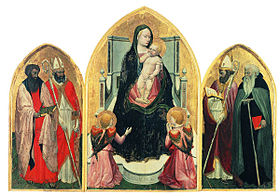Juvenal of Narni
| Saint Juvenal of Narni | |
|---|---|

The San Giovenale Triptych. The right panel depicts St. Anthony and St. Juvenal.
|
|
| Bishop and Confessor | |
| Died | May 3, 369 or 377 Narni, Umbria, Italy |
| Venerated in |
Roman Catholic Church Eastern Orthodox Church |
| Major shrine | cathedral of Narni |
| Feast | May 3 |
| Attributes | holding a sword in his mouth; holding a chalice |
| Patronage | Narni; Fossano |
Saint Juvenal (d. May 3, 369 or 377) (Italian: San Giovenale di Narni) is venerated as the first Bishop of Narni in Umbria. Historical details regarding Juvenal’s life are limited. A biography of Juvenal of little historical value was written after the seventh century; it states that Juvenal was born in Africa and was ordained by Pope Damasus I and was the first bishop of Narni and was buried in the Porta Superiore on the Via Flaminia on August 7, though his feast day was celebrated on May 3. This Vita does not call him a martyr but calls him a confessor. The martyrologies of Florus of Lyon and Ado describe Juvenal as a bishop and confessor rather than as a martyr.
Saint Gregory the Great in his Dialogues (IV, 12) and in his Homiliae in Evangelium speaks of a bishop of Narni named Juvenal, and describes him as a martyr. However, sometimes the title of martyr was given to bishops who did not necessarily die for their faith. Gregory also mentions a sepulcher associated with Juvenal at Narni.
In the Gelasian Sacramentary there is a prayer in honor of the saint under May 3. The Codex Bernense of the Martyrologium Hieronymianum records his name under May 3 with those of three martyrs of the Via Nomentana: Eventius, Alexander I, and Theodulus.
Saint Juvenal appears, not as a martyr, but as a bishop and confessor, in the Tridentine Calendar, which allots him a commemoration, shared with these three martyrs, within the feast of the Finding of the Cross on 3 May. When this feast was abolished in 1960, the four saints continued to be merely commemorated jointly within the celebration of the weekday. The same day continues to be Saint Juvenal's feast day, as indicated in the Roman Martyrology, but since 1969 he is no longer included in the General Roman Calendar.
...
Wikipedia
